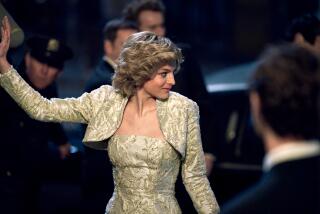Amid Pomp, the Blair Era Begins
- Share via
LONDON — In a blend of ancient ritual and new ideas, Prime Minister Tony Blair on Wednesday launched Britain on a reformers’ course toward social change and radical constitutional overhaul.
Queen Elizabeth II embodied ceremony and substance on a crystal spring morning, riding in her carriage to the Palace of Westminster with an escort of 234 red-coated and plumed cavalrymen. On her throne, wearing the bejeweled monarch’s crown, she read the traditional Queen’s Speech, opening Parliament and unveiling 26 key Labor government legislative initiatives.
The 12-minute inaugural address was the first prepared by the Labor Party since 1974, and Blair’s message was unmistakable in tenor and content: From gun control to a ban on tobacco advertising to government decentralization, he wants quick, wide-ranging changes--in the context of a free-market economy and controlled spending.
Key issues to be addressed over the next 18 months include education and health care reforms, proposals to increase employment and reduce crime and the introduction of Britain’s first minimum wage.
Labor will also propose referendums on creating a parliament in Scotland with taxing authority, as well as an elected assembly in Wales, and will offer Londoners the chance to elect a decision-making mayor and council for the first time in a decade in the nation’s capital.
“We speak as the one-nation party in British politics today. We speak for the whole nation, and we will serve for the whole nation,” Blair told the House of Commons after the queen and her court had returned to Buckingham Palace. He portrayed his government as “the alliance of progress and justice,” saying its goal is “to modernize what is outdated, to make fair what is unjust.”
Like Blair’s call for expanded freedom of information and cleaner, more transparent government, his proposals had been part of Labor’s platform for the May 1 election that brought him to power. Now, Blair’s unassailable 179-seat majority in the 659-seat House that began a five-year term Wednesday means passage is virtually assured.
That is precisely what the opposition finds worrying, former Conservative Prime Minister John Major told the House, cautioning the new government against arrogance in its zeal to sponsor change.
Major will remain the Conservative Party leader until the election of a successor in coming weeks. Powerfully scoring Blair’s actions, Major attacked Labor decisions to act without consulting Parliament in giving the Bank of England last week the right to establish interest rates, and in changing the format of the prime minister’s weekly appearances in the House to answer questions.
More than 200 new members of Parliament seemed as awe-struck as the Londoners and tourists who lined the streets to watch the pageantry of a royal procession unfurl in brilliant sunshine.
There was a royal blue and gold coach drawn by four white horses, there were the speaker of the House of Commons and the Lord Chancellor in black robes and the white-robed Lady of the Bed Chamber demurely following the 71-year-old queen in her floor-length white silk gown. Master of ceremonies was a retired army general known as Black Rod, after the black and gold baton he carries.
Three times Black Rod rapped on the closed door of the House. Admitted, he proclaimed, “The queen commands this honorable house to attend her majesty in the House of Peers.” The new members of Parliament, including a record 120 women, followed Black Rod in stately procession to the House of Lords.
Blair, standing in the back of the chamber alongside Major, listened with attentive contentment as the queen proclaimed Labor programs as government policy. Among them was a proposal to add educational and health agencies to the current arts and sports beneficiaries of what has become the world’s biggest national lottery.
In his campaign for office, Blair, 44, was careful not to make sweeping promises. Yet the strength and scope of his victory was such that winners’ expectations have quickly exceeded Labor’s commitments.
Thus, although the Queen’s Speech was notable for the number and variety of its proposals, what was not there also attracted comment. Analysts quickly noted that there was no mention of election reform promised by Labor, in conjunction with the third-party Liberal Democrats, to introduce proportional representation.
“Constitutional measures have to be taken in reasonable bites,” said Margaret Beckett, a top member of the Blair government.
Foremost among the government’s projects will be two bills restructuring education--Labor’s first priority in its campaign.
One bill would end subsidies paid under the Conservatives to about 40,000 children of poor families to attend private schools where educational standards are higher than in their neighborhoods. The savings will be used to help guarantee classes of 30 or fewer for children ages 5 to 7.
From education, Blair intends to move quickly into reform of the cradle-to-grave national health system, which he believes became too unwieldy and administrator-dependent under the Conservatives.
At the same time--with the support of an enthusiastic parliamentary majority--he will seek quicker justice for youthful criminals, and launch innovative programs to get 250,000 unemployed young people off the dole and into jobs.
More to Read
Sign up for Essential California
The most important California stories and recommendations in your inbox every morning.
You may occasionally receive promotional content from the Los Angeles Times.










